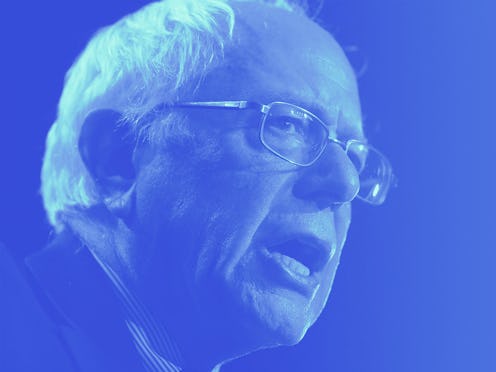News
2008 Sanders May Not Have Backed 2016 Sanders

Although many would argue that the writing has been on the wall for Bernie Sanders for weeks, the Vermont senator has vowed to stay in the fight for the Democratic presidential nomination until the party's convention in July. For this reason, it was no surprise when Sanders' campaign criticized the Associated Press for reporting that Hillary Clinton had enough delegates to secure the nomination Monday night. "It is unfortunate that the media, in a rush to judgement, are ignoring the Democratic National Committee’s clear statement that it is wrong to count the votes of superdelegates before they actually vote at the convention this summer," Michael Briggs, Sanders' campaign spokesman, said in a statement. Briggs also stressed that superdelegates "do not vote until July 25 and ... can change their minds between now and then."
What is surprising is that Sanders' current campaign philosophy appears to contradict, at least partially, his own approach when it came to endorsing a candidate in the 2008 election. As NBC News' Mark Murray reported on Monday, in 2008, Sanders told the Burlington Free Press that he was backing Barack Obama after the then-senator had secured enough delegates for the nomination through a combination of pledged delegates and superdelegates — before Clinton had officially dropped out of the race.
Granted, as the Burlington Free Press noted, "Sanders said he held off supporting either of the Democrats [Obama or Clinton] because he has made it a custom not to support any Democrat for the presidential nomination until the party had chosen its nominee." Sanders certainly waited until the 2008 race had mostly played out before making an official endorsement, but let's pause on that "mostly" part. Sanders has been insistent time and again on the trail that having the magic number of delegates — 2,383 — isn't sufficient if superdelegates are part of the count. However, that was the situation Obama was in when Sanders gave him his stamp of approval in 2008.
Sanders appears to have far more ire toward superdelegates in 2016. When speaking before the National Press Club in Washington, D.C., Sanders used the superdelegates in Clinton's totals as a justification for having a contested convention, saying that since she "will need superdelegates to take her over the top at the convention in Philadelphia ... it will be a contested convention."
Yet superdelegates did not seem to give Sanders such concern in 2008. Moreover, the difference in pledged delegates between Clinton and Obama in 2008 was closer than it currently is between Clinton and Sanders. In 2008, Clinton had 1,640 pledged delegates to Obama's 1,764. At the time of this writing, Clinton is beating Sanders in pledged delegates, with 1,812 to 1,521. Many Clinton surrogates have been quick to highlight these numbers to argue that the race was closer in 2008 than it is today.
Yet there may be one topic supporters of Clinton and Sanders both agree on: With the former secretary of state refraining from claiming the status of "presumptive nominee" and the Vermont senator slamming the Associated Press report, the Democratic race isn't over yet.
Image: Bustle/Dawn Foster